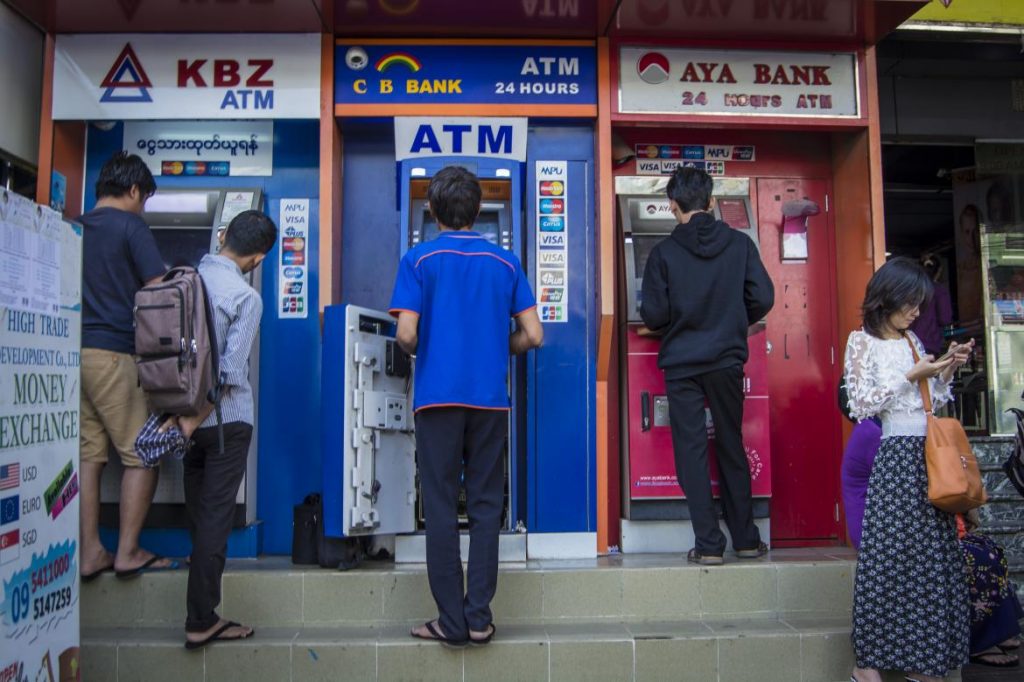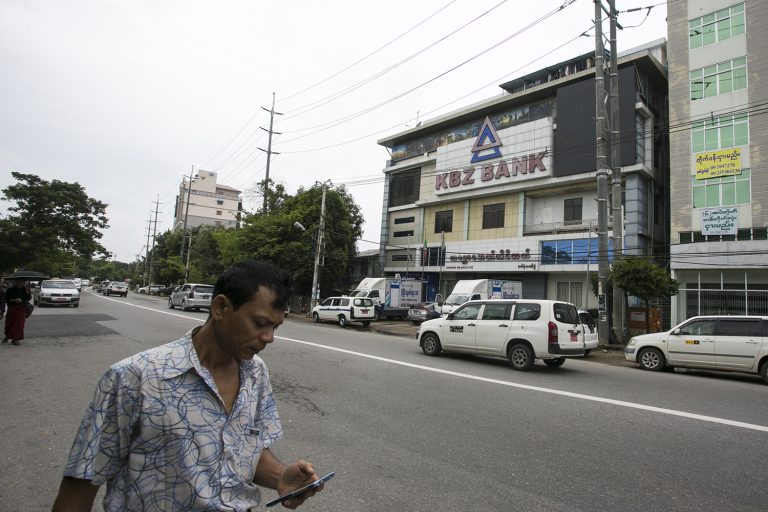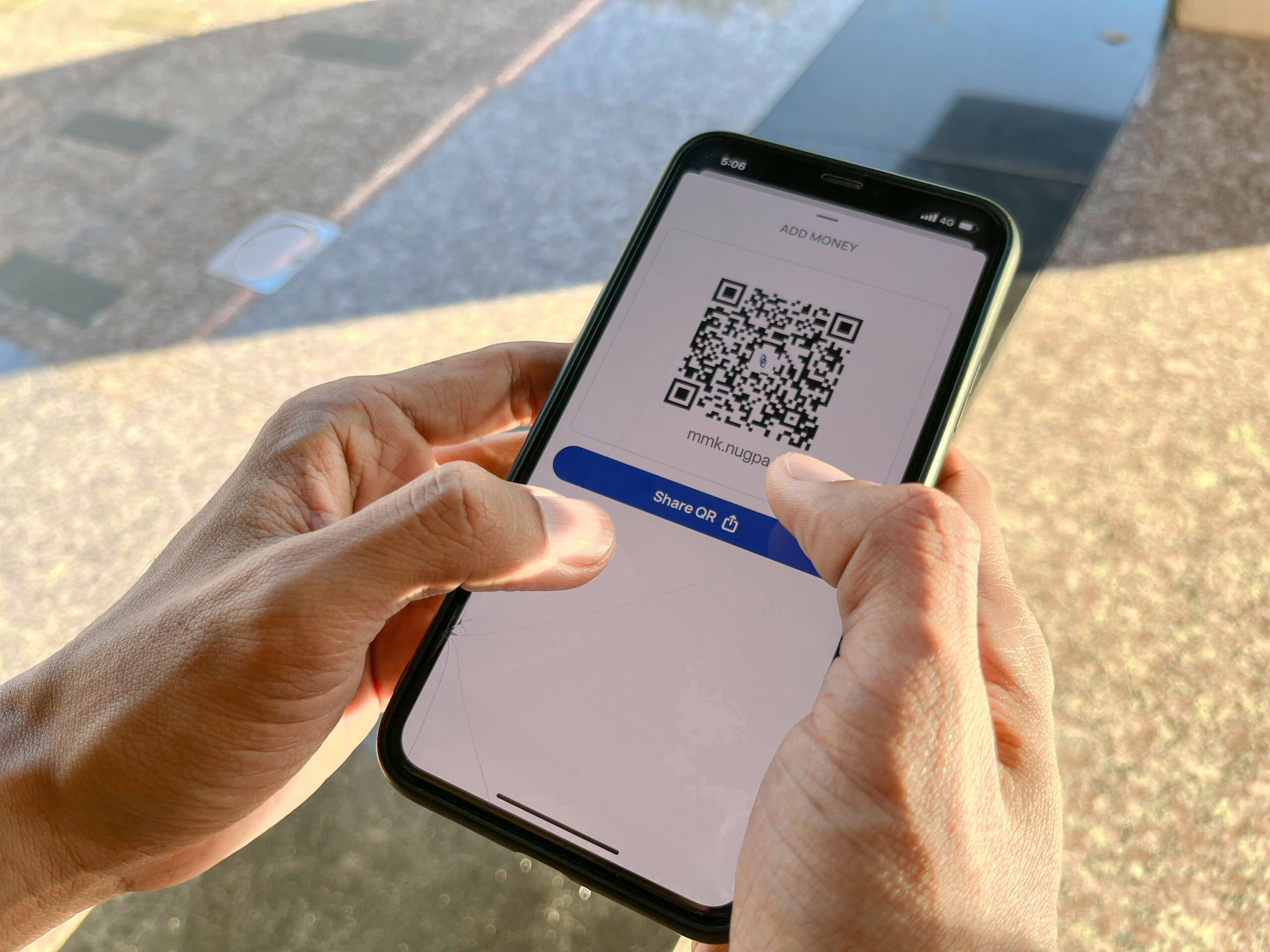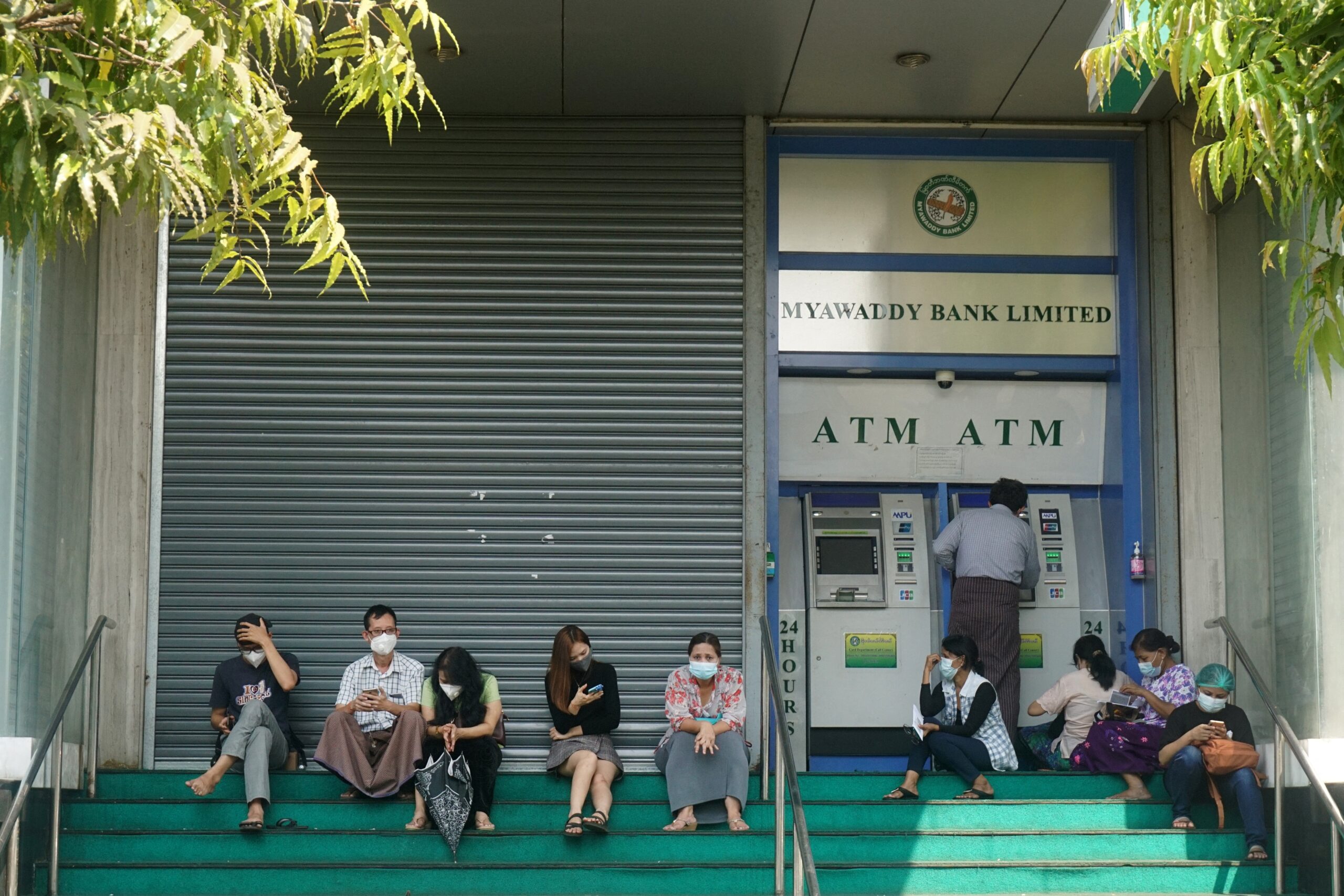CB Bank in October became the first financial institution in Myanmar to offer account holders the option of paying a utility bill over their mobile phone.
The option benefitted customers of the Yangon Electricity Supply Corporation and who in the commercial capital does not have a mobile phone nowadays?
The national mobile phone penetration rate is estimated at 62 percent, of which 80 percent are smart phones, show figures from telecom operators. An analysis of the figures shows that the three providers – MPT, Ooredoo and Telenor – have sold about 34 million SIM cards. Many of the sales were in Yangon and other urban areas where some users own two or three smart phones.
Three years ago, before Ooredoo and Telenor brought competition to a closed market, mobile penetration was about 10 to 13 percent. Some industry sources estimate it will reach 90 percent by the end of this year. That does not necessarily mean 90 percent of the population, especially in poorer rural areas most in need of access to financial services.
When Ooredoo and Telenor were awarded their licences in 2014, the telecom hype was all about “financial inclusion,” and taking services such as bill payments to the people in rural areas who account for 70 percent of Myanmar’s 53 million people. At least the hype is proving true for Yangon residents.
Support more independent journalism like this. Sign up to be a Frontier member.
“Bill payment via e-commerce, via electronic means, is no longer a possibility, no longer a hypothesis. It’s happening,” said Richard Buttenshaw, commercial director of ConnectNPay, in a speech at the 7th Mobile Money and E-Commerce Summit in Yangon last week.
ConnectNPay, a joint venture between Myanmar’s MCC Group and Singapore’s Leo Tech, has since May provided an e-link between service providers, such as utility companies, and payment partners, such as banks. From May to December it says it recorded more than 40,000 transactions worth K6.45 billion (about US$4.98 million) on its platform. To make the transactions possible the company had to help digitalise the data bases of state enterprises, such as the Yangon Electricity Supply Corporation.
“The utility companies don’t have a proper system; they are still doing things manually,” said Ko Zaw Min Thant, CB Bank’s deputy head of consumer banking. “So ConnectNPay built up the digital system for these state enterprises. They are an aggregate.”
CB Bank already offers mobile banking services to its clients, such as account transfers and credit card payments, which are digitalised, but ConnectNPay provided the necessary e-link to the utility companies. ConnectNPay has also digitalised the data of the Myanma Electric Power Enterprise, Myanmar Posts and Telecommunications and the Yangon City Development Committee. “They’ve totally digitalised the bill payment process,” Mr Buttenshaw said of the YCDC. “They’re managing every house. They know who owns what and who is renting it. And how much to bill them. And those bills now go through our platform.”
ConnectNPay is not the only service that is starting to turn hype into reality. During its first year of operations in 2015, Red Dot Network established a network of 10,000 retailers nationwide. The cash-in, cash-out e-commerce provider enables electronic payments for a range of services, including topping-up mobile phones, eliminating the need for scratch cards. With 10,000 outlets Red Dot’s national reach far exceeds that of the banks, which have about 1,000 branches throughout the country.
“We all know the banking infrastructure is not present enough, so that’s where Red Dot can help,” said Andrew Whelan, Red Dot’s chief marketing officer. Red Dot has also helped the banks by getting half of its retail clients to open accounts to facilitate transactions. “We’ve taken 5,000 retailers and put them in the banking system. And we estimate that many more are going to join the system, and we encourage them to join the banking system,” Mr Whelan said.
One reason for the hype about mobile banking in Myanmar is a reluctance to use banks. Few Myanmar people trust the banking system, which was crippled by a run on accounts in 2003 that bankrupted some banks.
“Aya Bank, CB Bank, KBZ Bank, Myanmar Apex Bank and Yoma Bank, these are the forward thinkers. Many of the other banks have no choice to participate in the digital business because they still work on paper, so that means they will be speaking against it.”
Some surveys estimate that only 6 percent of the population use more than one financial service and 24 percent use only one, most likely for remittances, which are a billion dollar business. “At the end of 2013 we estimated that there were 24 banks operating in Myanmar, and a total of about 1,000 bank branches,” said Brad Jones, chief executive officer of Wave Money, Myanmar. “So the bank penetration in Myanmar is about 2.6 per 100,000 population, the same number as Afghanistan, Haiti and Sudan,” he said.
Wave Money, a joint venture between Yoma Bank and Telenor Myanmar, is poised to offer a mobile money service in rural areas, targeting remittances. “We want to do remittances. Banks are doing them at the moment, but I believe that over time they will shift away from them for more profitable activities,” Mr Jones said. Wave Money has been testing its service for weeks but launching it will require a licence from the Central Bank of Myanmar. That will need to wait for the appointment of the new CBM governor by the next government.
In 2013 the central bank issued a first draft of Mobile Financial Services Regulations that defines the services in which telecom companies would be allowed to engage. The legislation has sparked debate in the banking sector, with some for and some against.
“Aya Bank, CB Bank, KBZ Bank, Myanmar Apex Bank and Yoma Bank, these are the forward thinkers,” said Tim Scheffmann, the managing director of Financial Intelligence Agency, a consultancy. “Many of the other banks have no choice to participate in the digital business because they still work on paper, so that means they will be speaking against it.”
Getting banks involved in the mobile money business will be important for the sector’s growth and to guarantee “financial inclusion” for the vast majority of Myanmar’s still unbanked population. The rapid spread of mobile phones suggests the banks stand to benefit from using, rather than blocking, the technology. In Bangladesh, where mobile penetration is 75 percent, legislation passed in 2010 forced the mobile money business to be bank-led.
“After providing mobile money in the past four-and-a-half years, the penetration in financial inclusion is like 35 percent,” said Jakirul Islam, the senior project manager of MicroSave, a global financial inclusion consultancy headquartered in Lucknow, India. “So the banking penetration [in Bangladesh] has increased from 13 per cent to 35 per cent in four to five years,” said Mr Islam.
To make mobile money work, banks need to deploy agents in rural areas, and training them requires time and investment.
“The biggest challenge blocking us is self interest, or the need for ROI, return on investment, for the shareholders,” said U Aung Aung, a director at Myanmar Citizens Bank, which is partly state-owned. “If I want to sign up an agent it takes two-three hours, and two or three of my people, and then when you’ve educated them someone will snatch him from you,” he said.
The involvement of banks is essential if the mobile money business is to reach its potential in Myanmar.
“The bank has to hold the trust account, so at the end of the day the bank has to hold the cash,” said Mr Jones.
If financial inclusion doesn’t happen in Myanmar, despite the rapid growth in mobile phone penetration, the banks may have something to answer for.







